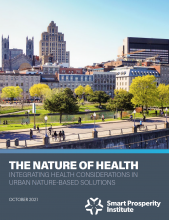The natural environment is important for human health. Greater access to parks, trees, and greenspaces in dense urban areas is linked to lower risks for several of the leading causes of morbidity and mortality in Canada. The Nature of Health explores the opportunity to leverage these connections and illustrates the role that nature-based solutions can have for building healthier and more resilient Canadian communities.
Despite a promising link between urban nature and human health, quantifying these health benefits continues to present a significant challenge for Canadian decision-makers seeking to capture the full value of using nature-based solutions. Ensuring an equitable distribution of health benefits from using nature-based solutions is an additional, ongoing concern. To address these challenges, The Nature of Health aims to provide a better understanding of the emerging nexus between urban nature, human health, and climate change, while highlighting the necessary tools, data, assessment methodologies, and evaluation techniques that are needed to capture the full value of health benefits from using nature-based solutions. Our report emphasizes that there are a growing number of opportunities and project tools available to support local and regional governments in Canada to accelerate the integration of environmental health considerations in their long-term strategic plans.
Summary of message from this report
- Nature has direct and indirect impacts on health outcomes. In Canada, more urban nature is shown to reduce the incidence of cardiovascular disease, lower the risk of respiratory illnesses, and reduce suffering from poor mental health.
- Positive health outcomes rely on the overall accessibility of nature. Factors that limit nature exposure also limit associated health benefits. This includes people’s perceptions of safety, sense of community, feelings of belonging and attachment, and sense of cultural dignity.
- Health benefits from urban nature are not distributed equally. Vulnerable populations are disproportionately affected by poor environmental health. Community engagement and health equity must be top of mid for planners and health advocates when considering the merits of nature-based solutions, as equity and inclusion issues strongly influence who benefits.
- The health-nature connection is well understood among local and regional governments across Canada. Empowering these governments to act on health with a clear and expanded mandate will be crucial for encouraging greater action on environmental health.
- Limited availability of ecosystem and health data continues to be a significant challenge. Lessons learned in diagnostic reporting during the COVID-19 pandemic may represent an opportunity to accelerate innovation around tracking local environmental health data, thereby increasing opportunities to establish environmental health baselines and determine health cost savings from using nature-based solutions.
- Many tools are available, but Canadian standards and best practice guidelines are needed. Standardizing measurements and processes, similar to what we have seen with Natural Asset Management changes, could help reduce transaction costs for integrating health considerations and make these types of projects more accessible across various settings.
- Existing funding streams are insufficient for generating cross-jurisdictional collaboration. At the local level, health and environment are connected through climate resilience and healthy city strategies. Yet funding streams are often fragmented across the local, provincial, and federal jurisdictions responsible for different aspects of nature-based solutions and health.
- Investments in nature-based solutions can generate substantial health cost savings. However, connecting natural features to specific health outcomes and these outcomes to cost savings is complex, and studies are limited. This can make it difficult to justify additional projects costs based on positive health outcomes.
- Integrated management of urban nature is key to building healthier communities. Adopting an ecosystem-based approach to manage urban nature would facilitate the integration of activities across local government departments to better track project performance, while also broadening the knowledge base currently used to advance discussions.
- Regional partnerships, multidisciplinary coalitions, and existing knowledge networks are driving innovation and collaboration around environmental health. Developing institutions and promoting strategies to mainstream nature-based solutions as a method for building both health and climate resilience is necessary to ensure these coalitions are able to continue building long-term and inclusive partnerships.
READ THE FULL REPORT
Read more SPI research on the nexus of health, environment, and economy:
- A green and healthy recovery: How different green economic recovery investments compare for advancing human health in Canada
- The nature of health: integrating health considerations in urban nature-based solutions
- Supporting a Greener Well-Being: Broadening Health in a Green Recovery
- The Health Co-Benefits of a Clean Growth Future
- The Benefits of Cleaner Air




